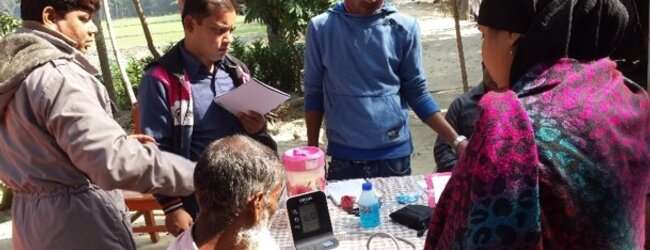Credit: Ed Fottrell
New research funded by the MRC highlights the success of a novel community-based approach to diabetes prevention in low and middle-income countries (LMICs). The scientists behind the research say their study is the largest worldwide to assess how to prevent diabetes in a general adult population of 125,000 people.
Researchers at the UCL Institute for Global Health and the Diabetic Association of Bangladesh conducted their work in Bangladesh, where almost a third of the population is affected by the chronic disease. Their results, published in the Lancet Diabetes & Endocrinology, show how community groups can cut diabetes risk by almost two thirds.
The scientists took a unique approach to addressing diabetes in rural Bangladesh. They created a lottery at a community meeting in which 96 villages' names were put into a jar and coloured, folded slips of paper were drawn to form three different groups. These groups became the experimental arms of the researchers' unconventional approach to preventing diabetes.
The first group of 32 villages received mHealth voice messages on their phones twice a week, the second group of 32 villages received facilitated community group meetings once a month, and the third group received usual care, visiting the doctor and paying for glucose testing if needed.
Two years later, the villages in which community groups had met regularly to chat about health, exercise, diet and stress had reduced their diabetes burden by a dramatic 64% compared to the usual care villages. The first group, which received voice messages on their phones, saw an improvement in people's knowledge of diabetes, but saw no changes in the burden of disease.
Associate Professor Ed Fottrell, who is principal investigator and project lead of the research, said: "Rather than focusing on high-risk individuals or those living with diabetes, we chose a general population approach that emphasised empowerment and community awareness raising to change behaviours and reduce diabetes risk. By the end of the project villagers had a much better understanding of how to prevent and control diabetes, many had started exercise clubs and even lobbied local markers to sell healthier foods."
Dr. Mark Palmer, MRC Director of International Strategy and Chair Elect of the GACD Strategy Board, said: "Diabetes is on the rise in Bangladesh, and around the globe, and the burden of the disease is significant not just on patients, but on the healthcare system. This new research provides invaluable insight into the fight against diabetes in Bangladesh, offering promising results at a community-level. We're thrilled to see such impressive results coming out of a project we funded through GACD."
In case studies collected by the researchers, study participants shed light on how the community-based approach helped them gain insight on how to manage diabetes risk.
One participant based in a small village called Faridpur said: "Before we didn't have any idea about exercising. We didn't know that diabetes can be controlled through exercise. We learned that from the meeting. We also didn't know that we should eat more vegetables. We used to eat more rice. I was also like that."
The Bangladesh D-Magic trial was fully funded by the MRC under the Global Alliance for Chronic Diseases (GACD).
The researchers say that if the community 'group chat' approach was to be scaled up nationally in Bangladesh, the government could save $51 million USD in healthcare costs per year. The majority of those costs are incurred by patients and their families.
The global prevalence of diabetes amongst adults over 18 has almost doubled since 1980, according to World Health Organization estimates. There were approximately seven million cases of diabetes in Bangladesh in 2017.
More information: Bangladesh D-Magic trial: www.ucl.ac.uk/igh/research/a-z/d-magic
Journal information: The Lancet Diabetes & Endocrinology
Provided by Medical Research Council























